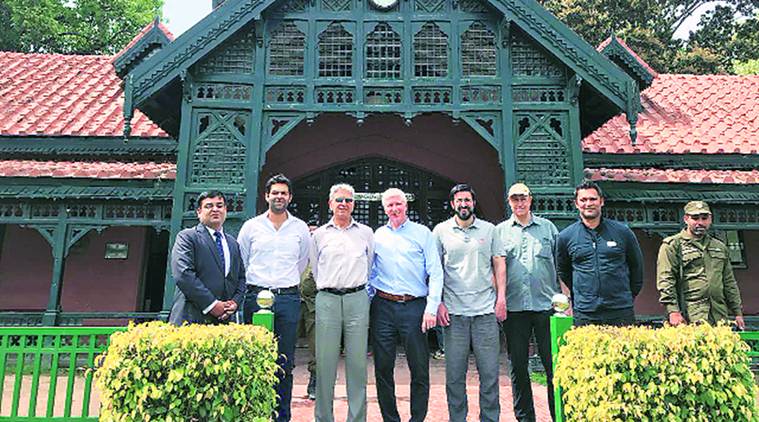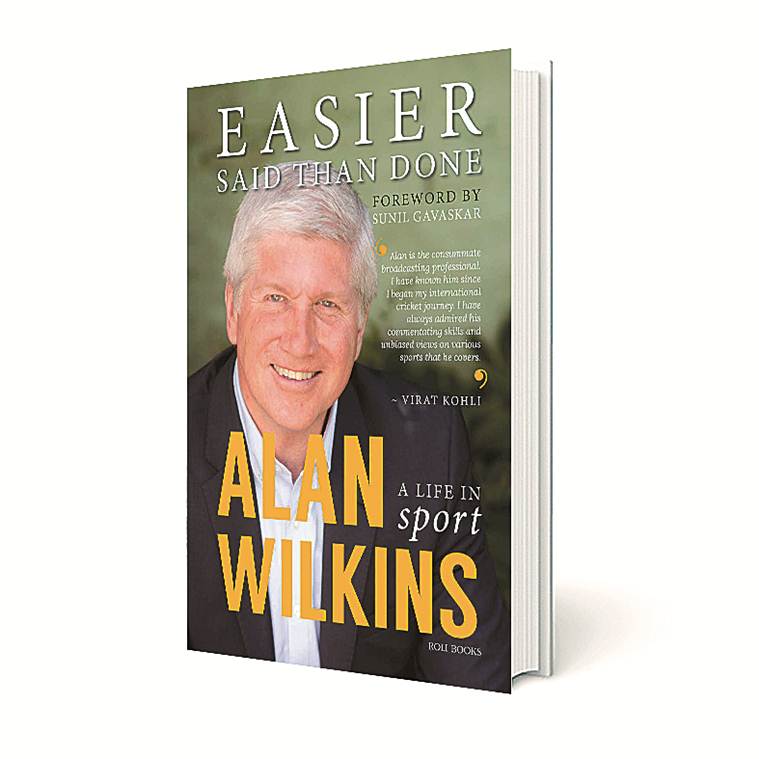Easier Said than Done book review: Love of the Game
In his autobiography, Alan Wilkins explores the changing face of cricket with empathy and self-deprecating humour

Bazid Khan with Alan Wilkins and father Majid Khan
Alan Wilkins is something of an oddity in TV cricket commentary teams that are made up overwhelmingly of celebrity cricketers. Even the ones who could never make it to the top — Laxman Sivaramakrishnan, for example — somehow draw notice as unfulfilled talent. Wilkins as a player, however, was never earmarked for greatness. He bowled left-arm medium pace for Glamorgan and Gloucestershire when almost every county team had seamers who wheeled their arm over to exploit the helpful conditions. After a shoulder injury put paid to his cricketing ambitions, Wilkins found his calling as a broadcaster. Formal, honest yet affable, the former Welsh pacer conveys the thrill of the game by playing second fiddle to his star colleagues in the commentary box, never missing a chance, however, to put in a sharp witticism. While most viewers in India would recognise him as a cricket and tennis broadcaster, Wilkins has covered golf and rugby — a sport that he flirted with during his playing days — as well.
In many ways, Easier Said Than Done, his autobiography, is a chronicle of the changing face of sport. County cricket had its professionals during Wilkins’ playing days, but this appellation belied the overwhelming amateur nature of the game which could make a 17-year-old teenage spectator take the field for unwell cricketers in a match against the visiting Indian team. Every county had its star overseas players. Wilkins shared the field with Vivian Richards, Clive Lloyd, Mike Procter, Gordon Greenidge, Imran Khan, Sadiq Mohammed, Bishen Singh Bedi, Dilip Doshi and Kapil Dev.
There were also home-grown luminaries — Ian Botham, Alan Knott, Graham Gooch and David Gower. But English county cricket during Wilkins’ playing days was one “big family” of “bright boys from Oxford and Cambridge, not-so-bright boys straight from school, former insurance salesmen, former teachers, smokers, dreamers and nutters”. Many of them were genuine athletes yet nobody thought of cricketers as athletes then. And, as the summers gave way to autumn, the men in flannels had to give serious thought to earning a living.
When Wilkins began his stint in the commentary box, one-day cricket was just about beginning to mark its presence. The Packer churn was less than a decade old, India had won a World Cup, and, there were murmurs of changes in the Anglo-Australian dominated world cricket firmament. By the time Wilkins the Welsh journeyman seamer had become Wilko of the commentary box, financial rewards in the sport had escalated remarkably — “the game had become unrecognisable, and not just for players”. The Twenty-20 leagues across the world “has changed the very base of the game and it seems like an almost different sport.” Players who seem like fish out of water in the five-day version of the game can make serious money by plying their trade in these leagues which showcase the instant avatar of the game. Umpires on the ICC’s elite panel command good salaries.
Wilkins brings to his autobiography the empathy that has been the trademark of his commentary. You can’t blame “any player for choosing to showcase his skill purely in Twenty-20 cricket, when there is a handsome living to be made”. It’s a trait that was, perhaps, taught to Wilkins by the vicissitudes of the sport. He did not have the options that present-day cricketers have when injury cut short his playing career. Wilkins states all this with self-deprecating humour.
Those with an appetite for anecdotes that show up the sport in all its beauty will find much in Easier Said Than Done. There is obvious joy at dismissing some of the modern greats such as Viv Richards, Sunil Gavaskar, Zaheer Abbas and David Gower. The Glamorgan No 11 was once nearly timed out in a match because he had spent too much time reading the newspaper in the lavatory. But a certain Malcom Marshall who was playing his first county match for Hampshire wanted to have a go at the medium pacer who had bowled him through the gate, and so Wilkins had to stumble out in the field, “a disheveled mess”.
He is unapologetic about his stint in South Africa because he wanted to go and see the “country for myself”. There is also an account of his now-well-known kafuffle with Navjot Singh Sidhu over pronouncing Indian names. And Wilkins had to cope with the extra demands of commentating on Test Cricket because, as Harsha Bhogle told him, “that fans sitting at home in India would expect to hear more commentary, not less”. As Wilkins writes, “watching the greats of Indian cricket at the highest level” was extraordinarily rewarding.
Easier Said than Done does a great job in making the reader partake of that pleasure.






















 Easier Said Than Done: A Life in Sport; Alan Wilkins; Roli Books; 296 pages; Rs 595
Easier Said Than Done: A Life in Sport; Alan Wilkins; Roli Books; 296 pages; Rs 595
No hay comentarios:
Publicar un comentario